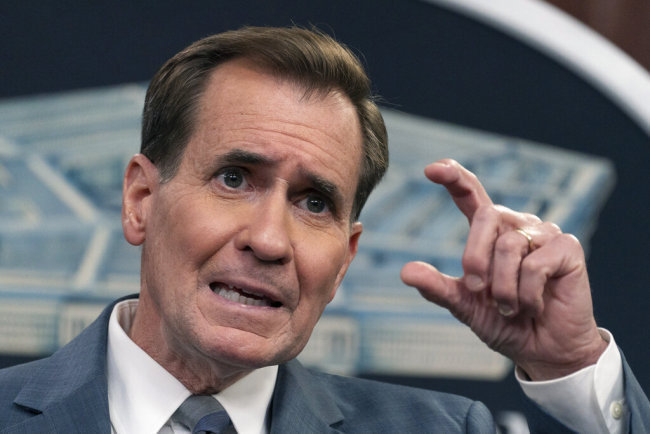Military weighs penalties for those who refuse COVID vaccine
As deadlines loom for military and defense civilians to get mandated COVID-19 vaccines, senior leaders must now wrestle with the fate of those who flatly refuse the shots or are seeking exemptions, and how to make sure they are treated fairly and equally.
The vast majority of the active duty force has received at least one shot, but tens of thousands have not. For some it may be a career-ending decision. Others could face transfers, travel restrictions, limits on deployments and requirements to repay bonuses.

Pentagon spokesman John Kirby speaks during a briefing at the Pentagon in Washington, Monday, Nov. 1, 2021. [Photo: AP/Manuel Balce Ceneta]
Exemption decisions for medical, religious and administrative reasons will be made by unit commanders around the world, on what the Pentagon says will be a “case-by-case” basis. That raises a vexing issue for military leaders who are pushing a vaccine mandate seen as critical to maintaining a healthy force, but want to avoid a haphazard, inconsistent approach with those who refuse.
Brig. Gen. Darrin Cox, surgeon general at Army Forces Command, said commanders want to ensure they are following the rules.
“Because of some of the sensitivities of this particular vaccine, I think that we just wanted to ensure that we were consistent and equitable" in meting out a punishment that would be “a repercussion of continuing to refuse a valid order.”
Military vaccination rates are higher than those of the general population in the United States and the reasons for objecting – often based on misinformation – are similar to those heard throughout the country. But unlike most civilians, military personnel are routinely required to get as many as 17 vaccines, and face penalties for refusing.
The military services are reporting between 1%-7% remain unvaccinated. Defense Secretary Lloyd Austin has called for compassion in dealings with those troops, which totals nearly 60,000 active duty service members, according to data released last week. Officials say the numbers change daily, and include those who may have gotten or requested an exemption. They have declined to say how many troops are still seeking an exemption or refused the vaccine.
Asked about possible variations in the treatment of those seeking exemptions or refusing the vaccine, Pentagon press secretary John Kirby said it’s up to the services. "Each case is going to be treated specifically and individually as it ought to be,” he said.
Kirby said Monday that the secretary doesn't want to tell commanders how to resolve the punitive measures, and instead trusts that they will do what is best for their units.
“So can we promise you that there will be absolute uniformity across the board? No. And we wouldn’t want to promise that because it wouldn’t be the same way we handle the orders violations for other offenses as well,” said Kirby.
It unclear how widely religious exemptions will be granted. Under military rules, commanders can take into account the potential impact on a unit’s mission, and reject a religious exemption if it puts performance at risk.
Commanders can also move service members into another job, deny them overseas deployment or limit unit access if they get an exemption or while a request is being reviewed. Those steps may be more common in smaller units such a special operations forces who usually deploy in small numbers.
The Navy has warned that sailors who refuse the shot and don’t get an exemption may have to refund bonuses and other financial payments, based on existing military justice procedures for disobeying a lawful order. The other services are expected to follow similar procedures.
Unvaccinated troops will also be subject to routine testing, distancing guidelines and possibly travel restrictions.